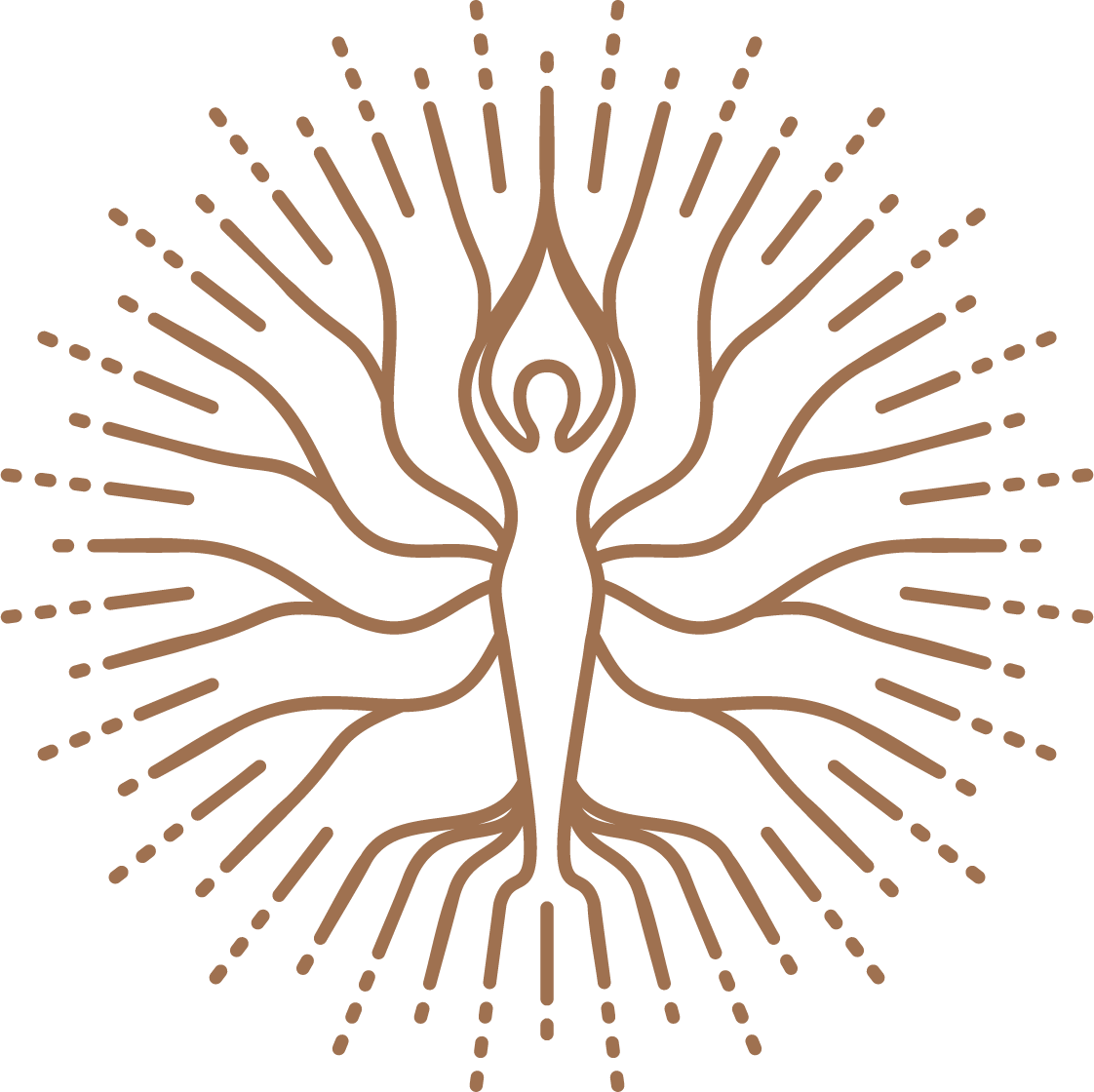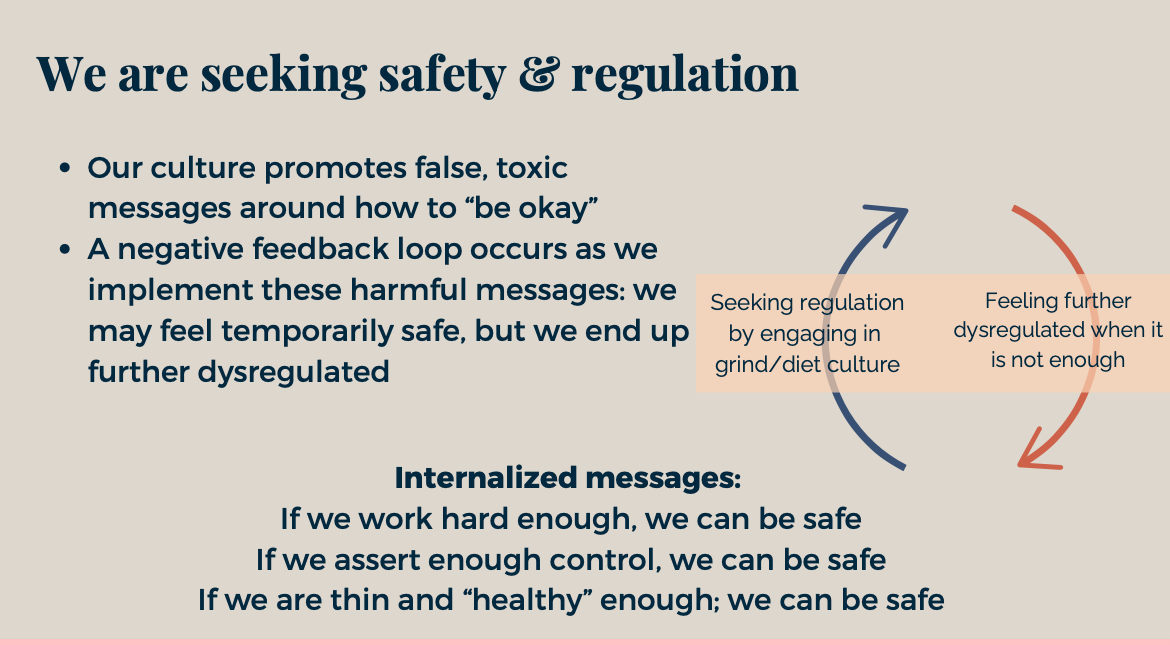Resting from Diet Culture: A Path to Body Liberation and True Rest
In a society driven by grind or ‘hustle’ culture and diet culture, many of us unknowingly chase an elusive sense of “enoughness.” But at what cost? The constant striving to fit societal norms of productivity and thinness (or even an ableist definition of ‘fitness’) often leaves us dysregulated, disconnected, and drained. At Rooted Recovery, we encourage you to step away from these pressures and explore the concepts of body liberation and genuine rest. If you are interested in learning more about our approach, we would love to have a conversation with you - reach out to us today!
Understanding the Grip of Diet Culture
Diet culture is more than just a collection of rules about food and body size—it’s an oppressive system that equates smaller bodies with health and moral virtue. It teaches us that our worth is tied to our weight, and that ‘projecting’ our bodies will ultimately bring safety, acceptance, and belonging. However, as dietitians specialized in disordered eating recovery, we have seen how this system perpetuates a negative feedback loop that will ultimately harm rather than heal.
Key harms of diet culture and weight stigma include (but are not limited to):
Nervous system dysregulation: The constant stress of striving for unattainable ideals and the unsafe environment perpetuated by weight stigma disrupts our natural rhythms, impacting both physical and mental health.
Increased risks of eating disorders and other mental health concerns: Dieting behaviors are a leading risk factor for developing disordered eating patterns, and dieting and weight stigma further contribute to depression and anxiety.
Disconnection from internal body cues, leading to chaotic eating patterns and poor health outcomes.
Slide by Julia Oliver, RD, LDN, ERYT for Georgetown University
The Oppressive Roots of Diet Culture: Racism, Sexism, and Ableism
Diet culture is deeply rooted in systems of oppression, including racism, sexism, and ableism. Historically, larger bodies were stigmatized to reinforce white supremacy and patriarchal control. Sabrina Strings, in her book Fearing the Black Body: The Racial Origins of Fat Phobia, explains how fatphobia was used to justify the enslavement and oppression of Black individuals by associating genetically larger bodies with negative traits, thereby positioning white European bodies as the ideal.
Over time, these biases evolved to disproportionately target women. Naomi Wolf, in The Beauty Myth, highlights how dieting became “the most potent political sedative” in history, keeping women preoccupied with self-scrutiny rather than systemic change.
Why Rest Feels Unattainable in Diet Culture
In a culture that glorifies hustle, rest becomes a privilege that not everyone can access equally. For individuals in larger bodies, rest is often withheld under the guise of needing to “earn” it through relentless self-improvement. Diet culture thrives on this deprivation, promising safety and belonging in exchange for compliance—but never delivering.
The truth of rest and regulation:
Rest is not a reward but a biological necessity. Chronic stress from weight stigma further exacerbates health inequities and keeps necessary rest out of reach.
Safety, where we can find true rest, comes from nervous system regulation, not from controlling or shrinking our bodies.
All bodies, regardless of weight, shape, or size, are deserving of care, respect, and rest.
5 Steps Toward Body Liberation
Breaking free from diet culture involves reclaiming your right to rest and regulation. Here are a few steps to get started:
Challenge the Narrative
Unfollow social media accounts and influencers that perpetuate diet culture norms. Instead, seek out voices that celebrate body diversity and reject weight stigma. (See our resource list for ideas of where to start!)Reconnect with Your Body
Practice listening to your body’s signals for hunger, fullness, and rest. Guided meditations or body scans can help you tune in to your internal wisdom. *The trauma experienced from internalized stigma may make connecting with your body feel inaccessible or unsafe, We encourage you to reach out to a trusted professional specializing in weight-inclusive care and a non-diet approach to walk alongside you in this process.Seek & Notice Glimmers of Regulation
Deb Dana, a leading expert on Polyvagal Theory, describes “glimmers” as micro-moments of regulation that spark feelings of safety and well-being. These might include noticing a friendly smile, hearing a soothing sound, or observing something beautiful in nature.Prioritize Wellbeing Over Weight Loss
Health isn’t determined by body size. Research shows that focusing on sustainable, weight-inclusive health practices—like joyful movement and balanced eating—leads to better outcomes than pursuing weight loss.Challenge Your Own Beliefs and Advocate for Inclusivity
Speak out against weight stigma in healthcare, workplaces, and schools. Support policies and practices that promote equitable treatment for all body sizes. Start asking reflective questions such asWhat have you been taught to believe about bodies? Your own body?
What would it be like to not have “body belonging” anxiety?
If you woke up tomorrow and lived in a fat positive, body affirming world, what would be different? - for you? for those around you?
Imagine a World Free of Diet Culture
How does diet culture keep you from resting? What would your life look like if you no longer worried about conforming to society’s narrow definition of “enough”? How might you show up differently for yourself and others? At Rooted Recovery, we believe in a future where all bodies are celebrated, and rest is seen as a right—not a privilege. If you have questions or are not sure if you could benefit from support on this journey, please reach out to us today!




